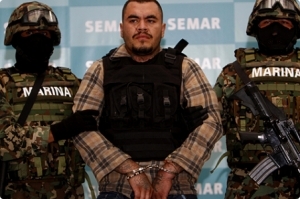Authorities this weekend captured Martin Omar Estrada Luna, alias “El Kilo,” who answered to the top levels of the Zetas criminal organization. But does Mexico even care?
Estrada was the commander of several Zeta cells in San Fernando, currently Mexico’s most infamous municipality. During his time in the region, 72 migrants, most of them from Central America, were executed last August.
Since then, in what appears to be as much random as targeted violent acts, another 145 mostly Mexicans were assassinated, many of them pulled from buses as they traveled north. These bodies have been turning up in bunches in mass graves authorities have unearthed in recent days.
The Mexican government blames Estrada for these deaths. It may be true. Mexican intelligence tells InSight that Estrada answered to Alejandro Treviño Morales, alias “Z-42.” Treviño Morales is the brother of Miguel Treviño Morales, alias “Z-40,” who, next to Heriberto Lazcano Lazcano, alias “Z-3,” is the most powerful member of this potent but scattered organization that operates throughout Mexico and the Isthmus.
Alejandro, for instance, reportedly has his base near Nuevo Laredo, one of the group’s strongholds along the border with Texas. His brother, Miguel, allegedly moves between the Mexican state of Veracruz and Guatemala. Together, the two have Zeta franchises operating up and down the region. This does not mean, however, they control the activities of their whole gang, which apparently includes Estrada.
As Excelsior reports, Mexican Marine intelligence says that Estrada may have been warned to keep the body count low by his superiors. He did not heed their warning. Subsequently, he was probably turned in to authorities by those same superiors who now see him as a liability.
The Zetas are battling nearly every major criminal organization in the country, including the Gulf Cartel in the state of Tamaulipas. Part of their strategy relies on fear. But there appears to be a fine line between wreaking terror to extend your influence via fear and becoming a terror and simply sulling the cartel name. Estrada may have crossed that line in what is a decidedly grey area for any criminal group.
The larger question for the Felipe Calderon administration and his party, the National Action Party (Partido de Accion Nacional – PAN), is does anyone in Mexico actually care that Estrada is now behind bars. The reaction to the arrest was largely muted, covered blandly in short paragraphs with little more than an ominous picture of Estrada in custody (as shown above). Readers seemed just as skeptical.
“‘Supposed,’ ‘supposed’ [assassin] and, in the end, no one is guilty,” wrote one reader about the government’s designation of Estrada as the killer to El Proceso, a magazine that has been very critical of Calderon’s counter-narcotics strategy. “Because the PAN government is not even capable of catching flies, only creating the ‘guilty’ who are later released.”
The government has had trouble keeping bad guys in jail. The most egregious recent example came following the arrest of the alleged assassin of a U.S. agent in February. Following the high level announcement, it was revealed the same man had been released in 2009, after being arrested on gun charges.
The government’s response was also tame in comparison to other high profile arrests. The marines, who had captured Estrada on Saturday in the state capital Ciudad Victoria, had a lengthy description on its site. But neither the army or the presidency (on its fancy new website) had any news of it.
It might be Calderon’s new strategy of tempering expectations, turning the government’s efforts into a more holistic rather than leader-centered approach. What may have been a major press event, complete with an announcement by the country’s security spokesperson, just a few weeks ago now does not even make the presidency’s webpage.
Calderon is fighting for his own and his party’s political lives. The war against these criminal organizations has turned into a referendum on his presidency, and his party’s ability to run the country, just months before the presidential campaigns begin in earnest.
And the holistic approach does appear more sound from a security standpoint, especially as the government struggles to adjust to this new reality on the ground – that of fragmented groups like the Zetas whose leaders take their own decisions in spite of the consequences for their organizations.

